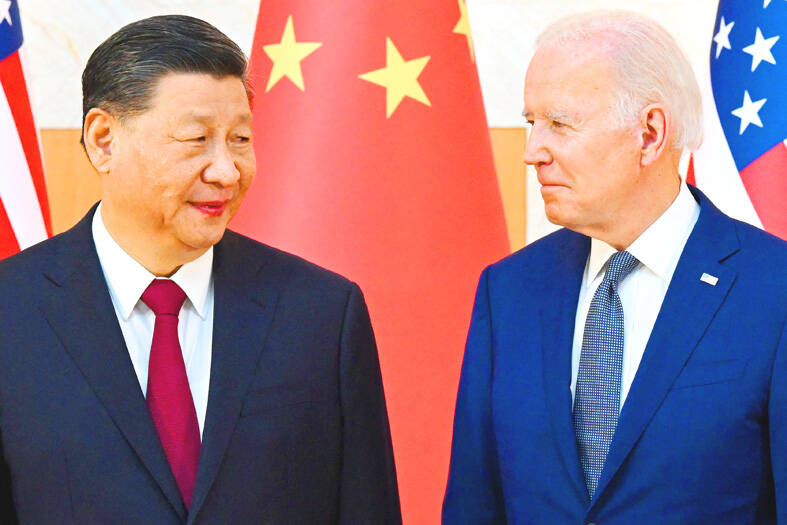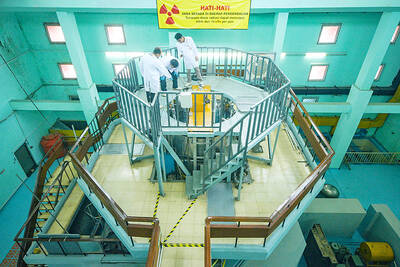After Chinese President Xi Jinping (習近平) spoke for more than three hours on Monday with US President Joe Biden on the sidelines of the G20 summit, China’s readout of the meeting indicates the country’s approach to US ties is shifting.
The leaders set a more positive tone for relations, which reached a low point after US House of Representatives Speaker Nancy Pelosi visited Taiwan in August. Xi and Biden greeted each other with a handshake and agreed to resume bilateral talks on climate change, economic stability, and health and food security.
The White House said in a statement afterward that US Secretary of State Antony Blinken would travel to China to follow up.

Photo: AFP
Plenty of disagreements remain, over topics including Taiwan, technology and human rights.
However, tensions have eased, with China’s statement offering the US more incentives to work together and issuing fewer warnings than other recent communications. Here are five key shifts in China’s language:
WARMER TONE
Beijing described the in-person meeting as “candid, in-depth and constructive” — with the last term usually used by China to suggest a positive development. When Xi and Biden spoke by telephone in July, just days before Pelosi’s Taiwan trip, that description was missing from the statement Beijing issued afterward.
The July statement was also just 911 characters long, while the more than 2,800-character readout following Monday’s meeting was more explanatory.
TAIWAN
In another sign that tensions have been dialed back, Xi told Biden that the US must abide by the “one China policy” rather than Beijing’s “one China principle,” as he did in July. That small tweak in language is an important recognition that the two sides interpret Taiwan’s status differently.
In July, Xi’s language about Taiwan was aggressive. The Chinese leader warned Biden that “whoever plays with fire will perish by it” and spoke of the “firm will” of China’s 1.4 billion people to defend the country’s territorial integrity.
That heated language was notably absent from Monday’s statement, although it is clear that the two nations’ differences over Taiwan are far from resolved: The statement described the nation’s fate as “the first red line that must not be crossed in China-US relations.”
SUCCEEDING IN PARALLEL
The statement used conciliatory language to state that US-China relations need not be a “strategic competition.”
In July, Xi bluntly accused the US of “misperceiving” China as a primary rival that posed a long-term challenge. On Monday, the emphasis fell on the benefits a rising China could bring to the US.
“The world is big enough for the two countries to develop themselves and prosper together,” Xi said, adding that “under the current circumstances, China and the United States share more, not less, common interests.”
ECONOMIC COOPERATION
In a similar vein, Xi in July warned the US against cutting China out of supply chains.
“Attempts at decoupling or severing supply chains in defiance of underlying laws would not help boost the US economy,” he said.
However, on Monday, Xi focused on mutual benefits, saying: “The two economies are deeply integrated, and both face new tasks in development. It is in our mutual interest to benefit from each other’s development.”
That said, he also told Biden that “suppression and containment will only strengthen the will and boost the morale of the Chinese people.”
Xi added that tackling climate change and other regional and global issues are both sides’ interest.
WHAT WAS NOT SAID
While the Chinese readout mentioned Russia’s war in Ukraine, it did not refer to the two leaders’ agreement that “a nuclear war should never be fought and can never be won,” or their opposition to the use or threat of use of nuclear weapons there.
Instead, it repeated Xi’s usual comments that China always stands on the side of peace and is willing to facilitate dialogues.
There was no mention of North Korea.
Xinjiang or Hong Kong were also absent from the statement, although the White House noted Biden had raised concerns about human rights in both locations.

Four people jailed in the landmark Hong Kong national security trial of "47 democrats" accused of conspiracy to commit subversion were freed today after more than four years behind bars, the second group to be released in a month. Among those freed was long-time political and LGBTQ activist Jimmy Sham (岑子杰), who also led one of Hong Kong’s largest pro-democracy groups, the Civil Human Rights Front, which disbanded in 2021. "Let me spend some time with my family," Sham said after arriving at his home in the Kowloon district of Jordan. "I don’t know how to plan ahead because, to me, it feels

Poland is set to hold a presidential runoff election today between two candidates offering starkly different visions for the country’s future. The winner would succeed Polish President Andrzej Duda, a conservative who is finishing his second and final term. The outcome would determine whether Poland embraces a nationalist populist trajectory or pivots more fully toward liberal, pro-European policies. An exit poll by Ipsos would be released when polls close today at 9pm local time, with a margin of error of plus or minus 2 percentage points. Final results are expected tomorrow. Whoever wins can be expected to either help or hinder the

North Korea has detained another official over last week’s failed launch of a warship, which damaged the naval destroyer, state media reported yesterday. Pyongyang announced “a serious accident” at Wednesday last week’s launch ceremony, which crushed sections of the bottom of the new destroyer. North Korean leader Kim Jong-un called the mishap a “criminal act caused by absolute carelessness.” Ri Hyong-son, vice department director of the Munitions Industry Department of the Party Central Committee, was summoned and detained on Sunday, the Korean Central News Agency (KCNA) reported. He was “greatly responsible for the occurrence of the serious accident,” it said. Ri is the fourth person

SKEPTICAL: Given the challenges, which include waste disposal and potential domestic opposition, experts warn that the 2032 nuclear timeline is overambitious Indonesia is hoping going nuclear can help it meet soaring energy demand while taming emissions, but faces serious challenges to its goal of a first small modular reactor by 2032. Its first experiment with nuclear energy dates to February 1965, when then-Indonesian president Sukarno inaugurated a test reactor. Sixty years later, Southeast Asia’s largest economy has three research reactors, but no nuclear power plants for electricity. Abundant reserves of polluting coal have so far met the enormous archipelago’s energy needs, but “nuclear will be necessary to constrain the rise of and eventually reduce emissions,” said Philip Andrews-Speed, a senior research fellow at the